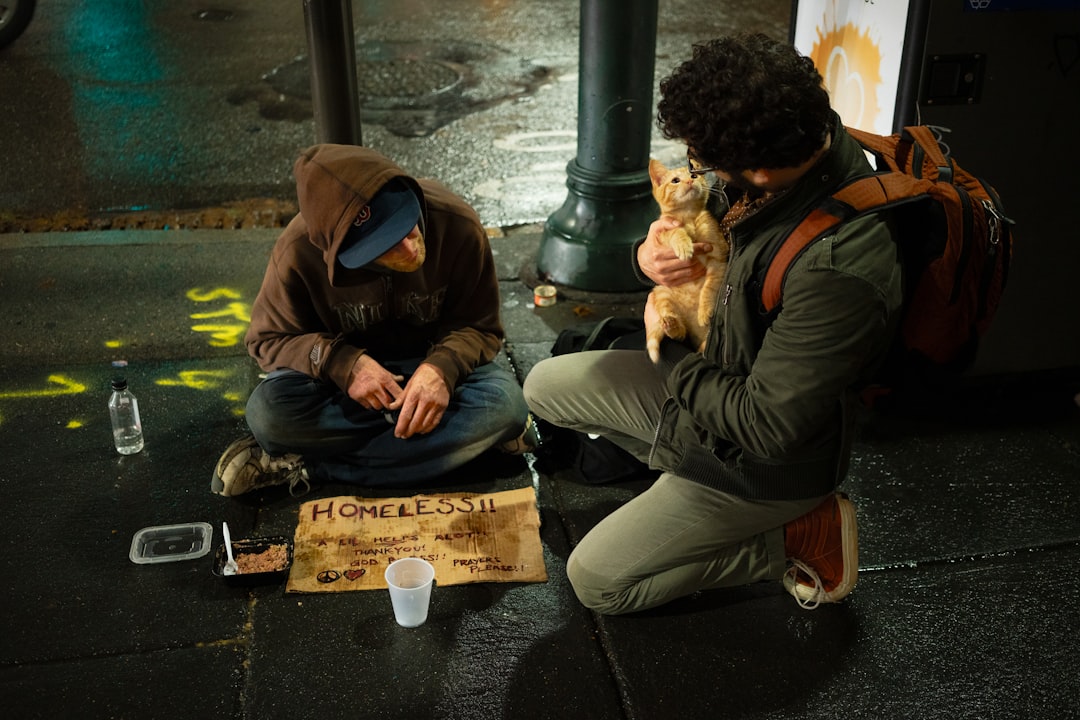Giving People Money Keeps People Out Of Homelessness. Like, Even Better Than Yelling At Them!
But yelling at poor people is more fun for those who yell.

As you probably know already, Yr Wonkette is a big fan of the idea of a Universal Basic Income, that pie-in-the sky Eurosocialist idea that we should tax the super-wealthy (and the merely wealthy, and even the upper middle class a bit) and make sure that everyone has at least enough monthly income to feed themselves and their family and keep a roof over their heads. There are a whole bunch of ways that could work, but that’s the basic idea, and the research generally shows that when you give poor people a certain amount of income monthly, with no strings attached, they spend it on very basic needs that they might otherwise have struggled with.
And now, a study in California suggests that providing a very basic cash stipend can reduce homelessness, too. About 200 unhoused people in Los Angeles and San Francisco signed up for the study; 100 were randomly assigned to receive $750 a month in cash, no strings attached, while the others were assigned to a control group. The control group were told they were on a waiting list, and got help accessing the state’s regular homeless services. Both groups also receive weekly calls from a volunteer phone buddy (more on that later) as part of an effort to provide social support. The participants all report back monthly to the researchers on their spending and are surveyed quarterly about their circumstances.
The study, by the USC Suzanne Dworak-Peck School of Social Work and nonprofit organization Miracle Messages, showed such promising results that the authors decided to publish interim results six months into the yearlong study. As the Los Angeles Times reports, the stipend made a significant difference, with the money going to:
food, 36.6%; housing, 19.5%; transportation, 12.7%; clothing, 11.5%; and healthcare, 6.2%, leaving only 13.6% uncategorized.
Those who got the stipend were less likely to be unsheltered after six months and able to meet more of their basic needs than a control group that got no money, and half as likely as the control group to have an episode of being unsheltered.
And no, Joe Manchin, the money didn’t all go to drugs and alcohol. According to the study’s lead author Benjamin Henwood, who directs the Center for Homelessness, Housing and Health Equity Research at the Dworak-Peck School, about two percent of the funds went to alcohol, drug expenses, or cigarettes — primarily cigarettes, in fact.
“It may not be earth-shattering that providing money is going to help meet basic needs, but I do think it dispels this myth that people will use money for illicit purposes,” Henwood said. “We weren’t finding that in the study.”
One of the most impressive results was that the stipends seem to have really helped people get off the streets:
After six months, only 12% of those who received funds reported being unsheltered at any time in the prior month, a dramatic decrease from 30% at the outset. Those on the waiting list also reported fewer unsheltered episodes, but by a much smaller margin, from 28% to 23%. […]
Among those receiving the funds, some found permanent housing, even though the money fell far below average rents in the area, Henwood said.
“It seems like it’s opening up possibilities in different ways,” he said. “They might have a friend or relative that may not be willing to support them completely, but if they have something to contribute that opens up a room.”
Those are preliminary results, but they’re pretty encouraging; after the study runs a full year, a more comprehensive report will be done; Henwood told the LA Times he didn’t expect those initial robust results to change significantly.
The genesis of the study is kind of cool, too; it grew out of a nonprofit program in San Francisco called Miracle Messages, founded by Kevin Adler, which “sends volunteers to the streets and shelters to befriend homeless people and try to make connections with the loved ones who had lost contact with them.”
That then evolved into a second effort called “Miracle Friends,” which matches unhoused people with a volunteer phone buddy — who can be anywhere in the country — for a weekly check-in call. When some of the phone buddies asked if they could send money to their homeless friends, Adler wasn’t keen on having them send their own cash, but liked the idea in general, so he started a pilot program to provide basic income to 15 folks in San Francisco. Naturally enough, that was called “Miracle Money.”
With a grant, Adler joined up with Henwood to design the study, and darned if it didn’t reinforce what previous UBI projects have shown: Give people money and they become better able to take care of themselves. It’s a pretty radical concept, huh?
[Vox / LAT / USC Suzanne Dworack-Peck School of Social Work]
Yr Wonkette is funded entirely by reader donations. If you can, please subscribe and help us meet our goal of 5,000 paid subscribers by the end of the year! Or if a one-time donation works better for you, here’s a button to speed that along. We too will not spend it all on drugs and booze.




The really fun part is when you show conservatives evidence that universal basic income works quite well, and they list all the reasons why that can't possibly be true.
>> Yr Wonkette is funded entirely by reader donations. If you can, please subscribe and help us meet our goal of 5,000 paid subscribers by the end of the year! <<
Universal Basic Wonkette!